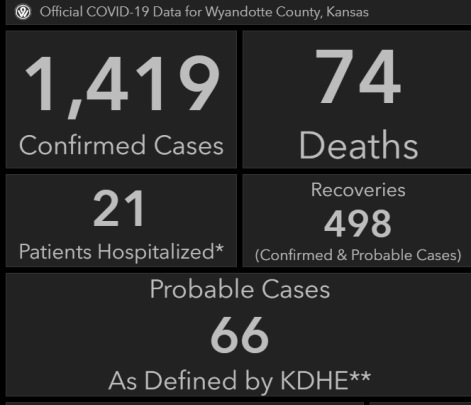
Children have not been as affected by COVID-19 as adults, according to doctors at a news conference on Wednesday at the University of Kansas Health System.
However, the doctors still recommended that parents and children continue safe social distancing, practice hand washing and wear masks when out in public if they are over 2 years old.
Wyandotte County reported a total cumulative 1,419 positive COVID-19 cases at 4:20 p.m. Wednesday, according to the Unified Government COVID-19 website. It was an increase of 43 cases since Tuesday evening. There were 74 deaths, the same as the previous day.
Dr. Dana Hawkinson, medical director of infection prevention and control at the University of Kansas Health System, reported 16 positive COVID-19 patients currently in the hospital, down one from Tuesday. Five patients were in the intensive care unit, up from four on Tuesday. No surges or spikes have been reported in the numbers of patients since some large public gatherings were held recently.
The state of Kansas on Wednesday morning reported 10,170 total cumulative positive COVID-19 cases from 89 counties, with 222 deaths, according to figures from the Kansas Department of Health and Environment.
Some other counties’ case counts: Ford County, 1,804 cases; Finney County, 1,478 cases; Leavenworth County, 1,097 cases; Johnson County, 893 cases; Seward County, 885 cases; Sedgwick County, 598 cases; Lyon County, 425 cases; Shawnee County, 336 cases; Jackson County, Kansas, 101 cases; Douglas County, 67 cases; and Riley County, 66 cases.
At a news conference Wednesday sponsored by the University of Kansas Health System, Dr. Robert Lane, executive vice president and physician-in-chief at Children’s Mercy Hospital, said doctors are starting to see more children patients again, through both telemedicine visits and in-person visits. Families reacted positively to telemedicine, he said.
Dr. Stephen Lauer, a pediatrician with the KU Health System, said the telemedicine program at KU Health System is a positive that he would like to continue, along with in-person visits. Patients need to come back into the office, especially to keep up their vaccinations, according to Dr. Lauer.
Dr. Angela Myers, division director for infectious diseases at Children’s Mercy Hospital, said she was taking an in-depth look at the literature and trying to implement lessons learned around the country and the world from the pandemic.
It was reported that Children’s Mercy Hospital earlier had a case of multi-system inflammatory syndrome. Some children with this syndrome have been hospitalized with very severe symptoms. The East Coast has experienced more than 150 cases in children.
Dr. Myers said multi-system inflammatory syndrome, a disease which has stricken some children two to four weeks after they have had COVID-19, has been a rare inflammatory response after infection. A low proportion of COVID-19 patients have had this response.
For the most part, children do not get as sick as adults from the SarsCov2, according to Dr. Myers. Most of those who do get sick, have very mild symptoms. A few will develop more severe symptoms.
Dr. Myers said a recent study has shown that child-to-child transmission is minimal, and also, child-to-adult transmission is minimal. She cited a study of 40 children diagnosed with SarsCov2 from Switzerland in March and April. The study was published in a pediatrics journal. In only a handful of cases did the child develop symptoms first.
“The story continues to evolve as we get more and more data,” she said.
The doctors will be monitoring results of other studies as information becomes available.
Dr. Lane said he was concerned about the effect of social isolation on children’s mental heath.
Dr. Lauer said it would be a huge issue going forward, and that children respond poorly to persistent levels of stress.
Dr. Lane suggested that parents get the children outside to play, to socialize as much as possible and interact, although keeping within the guidelines of social distancing, and with small numbers.
He said families will have to thoughtfully consider how to slowly start to have social interactions again. It is possible that a downside will come with that, as well, he added.
Dr. Lauer said the presence of a consistent caring adult spending time with a child, asking questions and being involved in their life, can make the difference, especially in stressful times.
Dr. Steve Stites, chief medical officer of KU Health System, said health care is safer today than before.
“Your risks are less, we do such a better job at infection control,” he said.
Dr. Lane said everyone at Children’s Mercy who comes to work has been screened every day and their temperatures are documented.
Dr. Myers said they’ve implemented good infection control practices, including cleaning surfaces, screening everyone every day and wearing masks.
Dr. Lauer advised caution in returning to sports and school, as they are learning more every day and it is still a very dangerous situation.
To view the KU doctors’ news conference, visit https://www.facebook.com/kuhospital/videos/291974031835352/.
The UG’s COVID-19 information page is at https://alpha.wycokck.org/Coronavirus-COVID-19-Information.
Wyandotte County is currently under the state’s Phase 2 plan at covid.ks.gov.
The state plan’s frequently asked questions page is at https://covid.ks.gov/wp-content/uploads/2020/05/Reopening-FAQ_5.19.2020_Final.pdf.
Additional guidelines from the governor’s office about Phase 2 are at https://www.wycokck.org/WycoKCK/media/Health-Department/Documents/Communicable%20Disease/COVID19/AdAstraUpdate519.pdf.
Test sites are listed at https://wyandotte-county-covid-19-hub-unifiedgov.hub.arcgis.com/pages/what-to-do-if-you-think-you-have-covid-19.
The CDC’s COVID-19 web page is at https://www.cdc.gov/coronavirus/2019-nCoV/index.html.
